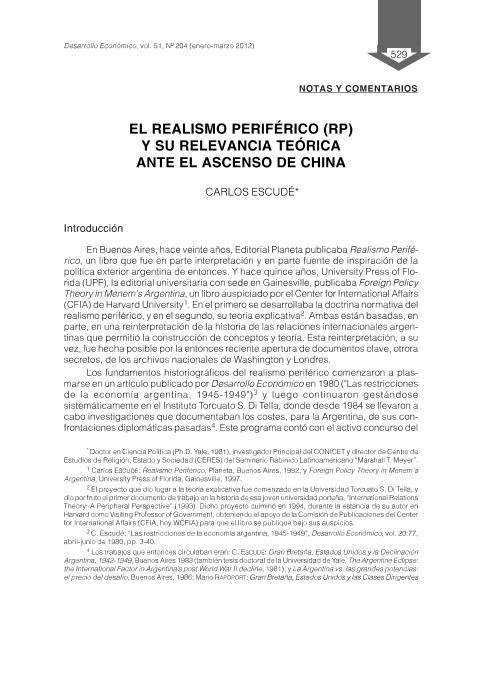Mostrar el registro sencillo del ítem
dc.contributor.author
Escudé, Carlos Andrés

dc.date.available
2016-12-19T22:11:31Z
dc.date.issued
2012-03
dc.identifier.citation
Escudé, Carlos Andrés; El realismo periférico (RP) y su relevancia teórica ante el ascenso de China; Instituto de Desarrollo Económico y Social; Desarrollo Económico; 51; 204; 3-2012; 529-542
dc.identifier.issn
0046-001X
dc.identifier.uri
http://hdl.handle.net/11336/9818
dc.description.abstract
El realismo periférico (RP) es una teoría de las RRII acuñada en los '90 en Harvard y la Universidad Di Tella, que está adquiriendo nueva vigencia con el ascenso de China. Sostiene que el sistema interestatal tiene una estructura jerárquica con una diferenciación funcional entre los Estados: formadores de reglas, tomadores de reglas y Estados rebeldes. Enfatiza los costes, para los ciudadanos de Estados sin poder para forjar reglas, de desafiar el orden establecido por los fuertes. Porque las maniobras frente a otros Estados son costosas, hasta los más fuertes enfrentan límites a su 'libertad' en el exterior. Es por eso que el RP sostiene que: ['libertad' ilimitada de un estado frente al mundo] = [tiranía interna absoluta]. Pero el umbral a partir del cual un Estado débil debe volverse totalitario, si ha de ser tan 'soberano' como uno fuerte, es más bajo cuanto más débil sea ese Estado. Por eso, la jerarquía interestatal es inevitable. Asimismo, esta ecuación advierte a los más fuertes que, ceteris paribus, las potencias más autoritarias tienen mayor libertad de maniobra externa, y más posibilidades de dominar sobre potencias más democráticas. En estos tiempos de transición, con la autocrática China cerca de ser una superpotencia, la ecuación fundacional del RP nos ayuda a comprender por qué es probable que ésta supere a las potencias occidentales.
dc.description.abstract
Peripheral realism (PR) is an IR theory coined in the 1990s at Harvard and Universidad Di Tella, which is acquiring a new relevance with the rise of China. It argues that the interstate system has a hierarchical structure based on differentiated state functions: rule-makers, rule-takers and rebel states. It focuses on the costs, for the citizens of states without rule-making capabilities, of defying the interstate order established by stronger states. Because a state's maneuvers vis-à-vis other states are costly, even the strongest ones face limits to their 'freedom' abroad. It is on these grounds that PR posits that: [total state 'freedom' vis-à-vis the world] = [absolute domestic tyranny]. But the threshold beyond which a weak state must become totalitarian if it is to be equally 'sovereign' to a strong one, is lower the weaker the state is. Hence, interstate hierarchy is inevitable. Moreover, this equation is also a reminder that, ceteris paribus, more authoritarian powers will have greater freedom of maneuver, increasing the probability that they will eventually prevail over more democratic powers. In the present time of world hegemonic transition, with China, an autocracy, rising to superpower status, the foundational equation of PR helps to understand why it is likely that Beijing will, in due time, overcome the Western powers.
dc.format
application/pdf
dc.language.iso
spa
dc.publisher
Instituto de Desarrollo Económico y Social

dc.rights
info:eu-repo/semantics/openAccess
dc.rights.uri
https://creativecommons.org/licenses/by-nc-sa/2.5/ar/
dc.subject
Argentina
dc.subject
China
dc.subject
Realismo Periférico
dc.subject
Teoría de Las Relaciones Internacionales
dc.subject.classification
Otras Ciencia Política

dc.subject.classification
Ciencia Política

dc.subject.classification
CIENCIAS SOCIALES

dc.title
El realismo periférico (RP) y su relevancia teórica ante el ascenso de China
dc.type
info:eu-repo/semantics/article
dc.type
info:ar-repo/semantics/artículo
dc.type
info:eu-repo/semantics/publishedVersion
dc.date.updated
2016-12-12T20:49:46Z
dc.journal.volume
51
dc.journal.number
204
dc.journal.pagination
529-542
dc.journal.pais
Argentina

dc.journal.ciudad
Buenos Aires
dc.description.fil
Fil: Escudé, Carlos Andrés. Seminario Rabinico Lat. "Marshall T. Meyer". Centro de Estudios de Religion, Estado y Sociedad; Argentina. Consejo Nacional de Investigaciones Científicas y Técnicas; Argentina
dc.journal.title
Desarrollo Económico

dc.relation.alternativeid
info:eu-repo/semantics/altIdentifier/url/http://de.ides.org.ar/desarrollo-economico-no-205-2/
Archivos asociados
